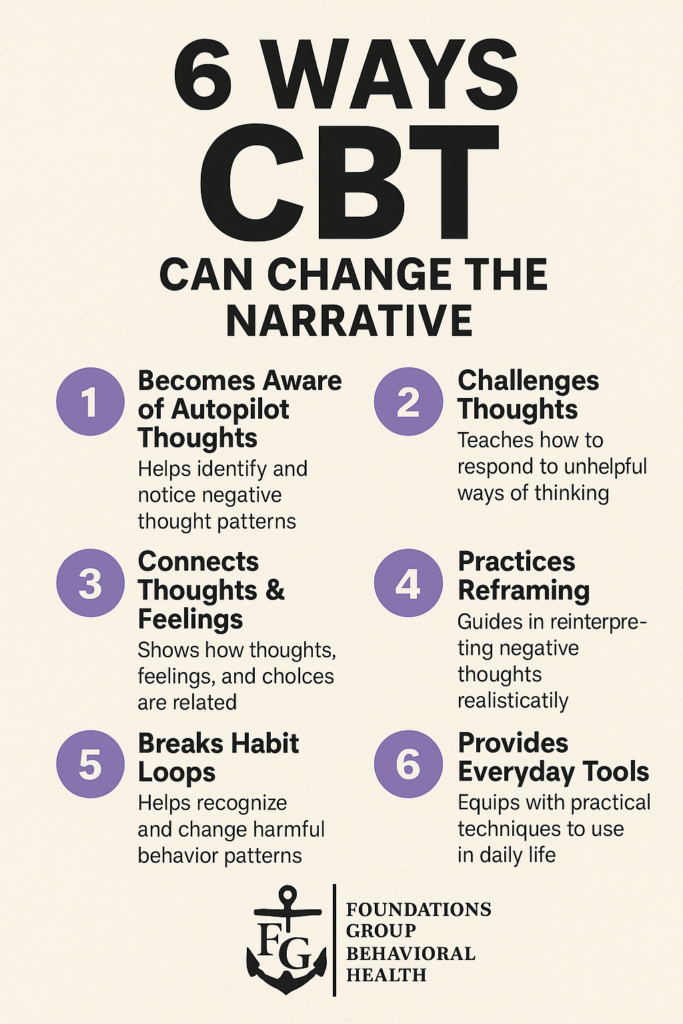If you’ve ever stayed up until 3 a.m. overthinking a text, replaying a trigger, or feeling trapped by a single voice inside telling you you’re not enough—you’re not alone. I’ve been there. And that relentless mental chatter nearly had me convinced it was just the story I’d always be stuck in.
Then I found cognitive behavioral therapy (CBT). And it didn’t instantly fix my life—but it did give me room to breathe again. It gave me tools I didn’t know I needed. It helped break the wireloops in my mind in a gentle, day-by-day way.
If you’re quietly stuck in a loop—and thinking there must be something better—here are six ways CBT can change the narrative, with enough practical detail to show you how it works.
1. It helps you become aware of autopilot thoughts
Before CBT, I thought my thoughts were me. I believed the instant judgments—the “I’m so stupid”s, the “They hate me”s—were just facts. But CBT helped me notice them as habits: mental loops I’d learned, unconsciously, since childhood.
That shift—seeing thoughts as patterns instead of truths—is the first step. Because you can’t choose a new path if you don’t know you’re walking the same old one.
When you learn to pause and ask “Is that thought really true?”, you’re teaching yourself to question before you act. And that pause alone can stop a spiral before it starts.
2. It teaches you how to challenge thoughts instead of just living them
Once you see a thought, CBT gives you tools to respond to it—without dismissing it or pretending it’s not there.
For example, if your inner monologue says:
“You’re going to say the wrong thing in that meeting.”
CBT prompts you to respond with:
“I’ve prepared. I’ve spoken up before. Mistakes don’t make me a failure.”
This isn’t cheerleading. It’s about replacing harsh inner critics with honest, kind, and practical voices—voices that recognize fear but refuse to be paralyzed by it.
3. It connects thoughts to feelings and choices
CBT teaches you something powerful: your feelings usually stem from your thoughts—not the other way around.
Let’s say you suddenly feel shaky going into a social situation. CBT makes you ask:
- What was I thinking right before I started feeling this way?
- Is that thought true or based on old fears?
- What’s another way to interpret the situation?
That shift—breaking the chain from thought → feeling → behavior—gives you choice instead of trigger-based reaction.
4. It has you practice reframing—not just wishing for a different mindset
CBT isn’t just about replacing negative thoughts with sunshine fluff. It’s about testing, not replacing:
- What evidence do I have for this thought?
- What would I say to a friend in this situation?
- Can I try a small experiment to see if this fear holds?
This is how you rewire the brain, one experiment at a time—not by empty positivity, but by curiosity. “Is this thought really accurate today?” becomes a powerful question.

5. It helps you break habit loops you didn’t know were there
Before CBT, I had patterns I’d repeated for years:
- Pushing people away when they got close
- Overworking until I had no energy left
- Quietly enduring anxiety about everything
CBT helped me see those loops and analyze them. For example:
- Thought: “If I ask for help, I’ll be weak.”
- Feeling: Fear, shame
- Behavior: Saying no, then burning out
Once I saw it, I started testing other options. Asking for help didn’t make me weak. Saying no sometimes felt good. Breaking one small loop shifted things forward.
6. It gives you tools to use every day—without relying on a therapist
One of the most freeing parts of CBT? It teaches you to be your own coach, inside your head.
Your therapist might introduce:
- Thought recordings: Jot down what happened, what you thought, how you felt
- Behavioral experiments: Try speaking up once this week, then reflect
- Coping cards: Short statements like “I am allowed to feel this,” or “This feeling is not forever”
You carry those tools into real moments—so therapy becomes less a session and more daily practice.
Ready to See If CBT Is a Good Fit?
If you’re tired of being trapped in your own head, CBT might be the key to stepping out—without feeling like “therapy is too much.”
Foundations Group Behavioral Health offers expert cognitive behavioral therapy in Massachusetts that’s warm, practical, and tailored to people just like you.
We meet you where you are. We listen first. We don’t fix things overnight—we build them, with you.
Call (888) 685-9730 or Contact Us to take your first step.
You deserve more calm, more clarity, more control. And it doesn’t have to start in crisis—it can start with a question.
FAQ: Curious about CBT?
Q: Does CBT really help me feel better?
A: Yes. While CBT is cognitive, it builds emotional change by rewiring ways of thinking—so over time your feelings shift, too.
Q: What if I’m not sure I have a big problem?
A: CBT isn’t only for crises. It helps with everyday stress, overthinking, perfectionism, and even self-esteem rebuilding.
Q: Is CBT long-term therapy?
A: CBT is often short- to medium-term—many people see clear changes in 6–12 sessions. Then you can slow down or stop as self-coaching takes over.
Q: Can I try CBT even if I’m in another therapy?
A: Absolutely. CBT can complement deeper talk therapy, trauma work, or any other form of support you’re already using.
Q: Do I need to do homework?
A: That’s up to you. Homework is optional but can accelerate awareness and progress. Start light—just one tool a week is powerful.
You’re Not Alone in This
If your thoughts feel loud and relentless, CBT likely isn’t just “good to know.” It could be exactly what helps you feel like yourself again.
You deserve space from the chaos inside. And that clarity? It begins with a question, a tool, and a therapist who believes you can change your day-by-day story—thought by thought.








